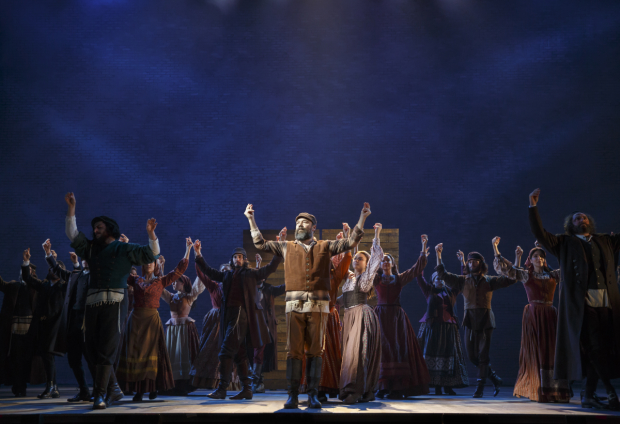Fiddler on the Roof
Danny Burstein stars in a radiant new production of one of Broadway’s favorite musicals.

(© Joan Marcus)
A deafening train whistle marks the beginning of the latest revival of Fiddler on the Roof at the Broadway Theatre. It is the sound of the 20th century reaching Anatevka, and the death knell of the traditional Jewish society residing there. Such rapid transportation (not to mention the telegraph wires hanging above the tracks) can only disrupt a culture many had assumed static and unchanging. It's a bold opening shot from director Bartlett Sher, who manages to offer a fresh perspective on this most beloved of Broadway musicals while also honoring its past.
Since debuting on Broadway in 1964, Fiddler has been remounted roughly every decade (this production marks the fifth revival). It's a perennial favorite and surefire box office hit: Even the antiseptic 2004 production (often derided as "Goyim on the Roof") managed to run a remarkable 781 performances. With heart-pounding music by Jerry Bock, sentimental lyrics by Sheldon Harnick, and an unforgettable book by Joseph Stein, Fiddler is practically indestructible. In the hands of a sensitive and shrewd director like Sher (The King and I), it is positively transcendent — a luminous new view on a timeless tale.
Based on the short stories of Yiddish author Sholom Aleichem, the story follows Tevye (Danny Burstein), the Jewish dairyman for the little Ukrainian village of Anatevka. It is 1905 and Tevye lives with his wife, Golde (Jessica Hecht), and their five daughters. The eldest, Tzeitel (Alexandra Silber), has caught the eye of wealthy town butcher Lazar Wolf (Adam Dannheisser), but is actually in love with poor tailor Motel (Adam Kantor, playing the notable nebbish with a painful yet appropriate timidity). Tzeitel and Motel hope against hope that Tevye will approve their marriage.
Meanwhile, the train brings strange new books and even stranger men, including communist student Perchik (the stormy Ben Rappaport), with whom Tevye's second daughter, Hodel (Samantha Massell), has a love-hate relationship. Third daughter, Chava (Melanie Moore), is more taken with the books, and because of that the gentile Fyedka (Nick Rehberger) falls in love with her. Jews and gentiles live in an uneasy peace in Anatevka: The threat of a pogrom always looms. A mixed marriage is out of the question. As the winds of change howl against the walls of tradition, Tevye must decide just how much he will bend with the times.
As always, it is the women who really lead this revolution. Never has a Fiddler brought so much palpable girl power. Silber, Massell, and Moore build a quiet strength and solidarity among the daughters. A somewhat morose "Matchmaker, Matchmaker" sets the conflict in motion: They know what they're supposed to do, but they can see alternatives beyond Anatevka and wonder why they can't have them too. That's not to say that women are completely powerless in this world. Alix Korey is a commanding (and very funny) Yente, the matchmaker. Hecht's Golde is the neck that turns the head of the household: Teyve practically cowers in fear of his no-nonsense wife.
None of this proto-feminism would be possible without an amenable patriarch and we have that in Burstein's Tevye. Even more than his predecessors, he portrays a man who is thoughtful and understanding, pushing through difficult times with self-effacing humor. Above all, he conveys a common decency that is the linchpin for the entire story. This is the role Burstein was born to play.
In addition to Tevye, Burstein portrays a man in a red Gore-Tex coat. He frames the narrative by reading from an old book, presumably of Aleichem's stories. He is us, a 21st-century person looking back on the past with a mixture of fondness and fascination. Consequently, none of the stage action feels entirely real, but rather an intangible memory.
Michael Yeargan's sketch of a set reinforces this feeling: It is two-dimensional and only half-remembered. Houses and fields of wheat float through the air, untethered to the Earth. Flowering trees decorate the stage. Lighting designer Donald Holder bathes the stage in a nostalgic burnt orange during "Sunrise, Sunset," creating a gorgeously autumnal portrait of the shtetl. As the play progresses and Anatevka slips away, the leaves fall from the trees, creating an increasingly desolate mise-en-scène.
Catherine Zuber's richly patterned costumes complement the overall look. During "Tevye's Dream," the actors don grotesquely angular green masks, looking like they jumped out of a Chagall painting: It's a perfect reference for this expressionist take on Fiddler. When not in their zombie apparel, the ensemble actually looks quite chic. The design team liberally exploit the fact that, like the changing seasons depicted onstage, style is cyclical: Certainly, the sexy bearded men of the ensemble wouldn't look out of place at fashion week (hair and wigs by Tom Watson). This modern aesthetic accompanies a sound that is pure old-school Broadway thanks to Ted Sperling's shimmering orchestrations.
No element of the production better represents the happy synthesis of old and new than Hofesh Shechter's vibrant choreography. We recognize the most iconic elements (the tropak, the shimmy, the bottle dance) of Jerome Robbins' original work, but the pulsating vigor of the dance also suggests Southern Baptists possessed by the spirit and whirling dervishes lost in contemplation. Shechter and Sher offer this story of a traditional society at the precipice as something universal, without negating the play's indelible Jewish identity.
Most hearteningly, Sher endows this beautiful and timely production with a sense of optimism and continuity. Heartbreaking as their exodus from Anatevka is, one suspects that Tevye's daughters will create fresh traditions in the new world (summers in the Catskills, Chinese food on Christmas) and that the next generation will similarly rebel against them. They will endure, guided by the past (but not slaves to its orthodoxy), as the world is forever reborn. It's a balancing act as difficult as playing the violin on a gabled roof, but one that is unquestionably worth it.









